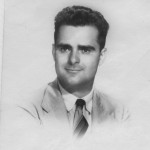China’s Wings’ original manuscript was way too long. I spent most of the 18 months prior to publication trimming it into something readable, but due to their being “too far off the spine,” I gave the chop to many of my favorite scenes. The one that follows was the hardest cut of them all. I took it out and put it back several times before eventually deciding to let it go. But it’s a good scene, and a funny one… it’ll take a few posts to tell, but here goes. Part one of three….

Square-jawed Hugh Woods had a flight from Chungking to Hong Kong scheduled one afternoon, and he particularly expected to enjoy it, for on the passenger manifest was Emily “Mickey” Hahn, The New Yorker’s far eastern correspondent. Woody wasn’t acquainted with her from their mutual Shanghai years, but he certainly knew of her, for Mickey Hahn was, without rival, the most notorious American woman in the Far East. She poached married men without scruples, and she’d stayed in Shanghai through the 1937 fighting, at the end of the battle becoming the Number Two wife of her Chinese lover, poet Zau Sinmay, in order to exploit a loophole in Japanese reasoning that allowed her to rescue the Zau family’s priceless Ming Dynasty library from the wreckage of their home north of Soochow Creek. Mickey joined Zau’s circle of opium users, and her addiction to “the big smoke” deepened through 1938. She landed a contract to write a book about the three famous Soong sisters in 1939, and the magnitude of the looming authorial task motivated her to take the cure. (“The Big Smoke,” Hahn’s short story about opium, is a neglected classic.) Painfully rehabilitated, she’d traveled to Hong Kong and thence to Chungking, interviewing her principals and their associates. She’d stayed in Chungking through the spring and summer and finished her manuscript under the rain of bombs. It was with the precious pages tucked among her belongings that she made ready to leave Chungking.

A friend drove her twelve miles to the military airport and introduced her to Hugh Woods and William Bond, who was also traveling aboard. Quiet Woody had a weakness for cute, perky brunettes, and physically, Mickey Hahn was just his type. Being a pilot, Woods probably felt himself hopeful as he climbed the Douglas out of the bomb-battered city. He hit turbulence at cruising altitude. When the air smoothed, Woody summoned Miss Hahn to the cockpit, ordered his copilot aft, and slipped her into the vacated seat. A bewildering array of buttons, switches, dials, indicators, levers, lights, controls, and pedals crammed the cockpit. Woody broke the ice with a quick flying lesson. He kept the rudder pedals himself and gave Mickey the yoke, and she flew the plane, thrilled, and feeling important, although even with Woody’s patient tutelage, her unpracticed hand porpoised the sleek Douglas through the Chinese sky like a breathing cetacean – up-down, up-down, up-down. Riding in the back with a planeload of “noisily airsick” Chinese civilians, Bond scribbled a note to the cockpit commenting on “the shakiness of the plane since Miss Hahn took over.”
Woody retook the yoke, smiling, but he kept witty and vivacious Mickey in the right-hand seat. He held the plane on course without effort, ten thousand hours of experience handling the plane with unconscious mind. Mickey was a lively storyteller with a knack for fobbing off extraordinary occurrences as common and normal. Her oval countenance peeled into bright smiles, and mischievous glances flashed from dark, green-dappled eyes. Night fell. Woody felt better when darkness wrapped the plane, and they cruised through the night over a carpet of clouds, safe above the Japanese occupation. Mickey was at loose ends, planning to knot up the threads of her life and return to the United States. Her paramount worry was finding a home for the two pet gibbons she’d left in Shanghai. An Australian lady was escorting them to Hong Kong on a steamship. Chuck Sharp had once mentioned wanting one as a pet.
Woody immediately volunteered their apartment.
I’ll continue the episode tomorrow. In the meantime, here’s an interesting article about Micky and Zau Sinmay at China Heritage Quarterly, here’s her obituary in The New York Times, and here’s Roger Angell’s excellent “Postscript” in The New Yorker (only subscribers get access to the full text, I’m afraid). Here’s a piece on Hahn’s love affair with Zau Sinmay. Here’s a translation of one of Zau’s poems.
And here’s the second part of this story.


9 Comments